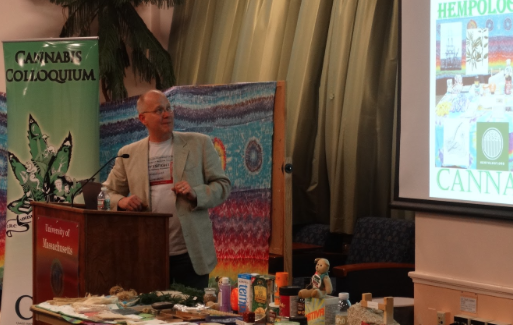After legalization, cannabis reform activist says there is still work to be done
More stories from Jon Decker

AMHERST — The University of Massachusetts Amherst Cannabis Reform Coalition (CRC) hosted guest speaker John Dvorak Tuesday night, a pro-hemp activist who has been fighting for cannabis reform for more than 20 years.
Massachusetts voted to legalize the use and commercial sale of marijuana Nov. 8, but the federal government still classifies it as a Schedule I drug. Dvorak said that while there’s been enormous progress made so far, there’s still a long way to go for cannabis activists.
In his presentation, Dvorak gave what could best be described as a sales pitch about the benefits of legal cannabis. He focused much of his talk on dispelling the narrative of the anti-pot campaign that has been waged over the last eighty plus years, starting with the Marijuana Tax Act of 1933. He highlighted the large amount of harm that marijuana prohibition has caused, stating that “millions” of lives have been ruined because of current policies which can lead to incarceration and criminal records.
In Dvorak’s view, not only is it important to legalize marijuana for recreational use, but the country could benefit from allowing the cultivation of industrial hemp, which has a wide range of uses that have nothing to do with getting high.
Dvorak says the crop has been used by humans for over 4,000 years for a diverse range of purposes — from automotive parts to alternative medicines to industrial fibers and spiritual vehicles. Because of the crop’s wide range of uses, Dvorak said jokingly, “hemp is the answer, I’m not sure what the question was.”
Throughout each of his busy, scattered slides, Dvorak tried to elicit student participation.
He stressed that much of the information he presented still needs to be researched further and more extensively written on. He called on students from practically all majors to explore topics relevant to their skill set in what Dvorak believes is going to be a booming industry or a “Dot.Bong” era.
But in order to get there, Dvorak says there are “a million baby steps to be taken,” and that the event was just one of them.
Dvorak believes there are still many challenges facing the movement, including a particular set of circumstances he calls a “catch-422.” In short, because the federal government classifies cannabis as a Schedule I narcotic, it is illegal to do research on it. The catch is, the reason the drug remains classified in Schedule I is because there is not enough research on it, according to the Drug Enforcement Agency.
Another challenge still facing the movement, according to Dvorak, is a lack of unity in the cannabis legalization movement. Although many groups share the same goals, Dvorak believes there is still too much infighting among pro-cannabis legalizers.
Towards the end of the night, Michael Bourque, the co-founder of CannaKorp, showcased a product he invented called the Cannacloud, a 3-D printed vaping device designed for medicinal uses.
Email Jon at jhdecker@umass.edu or follow him on Twitter @Jon_H_Decker.
